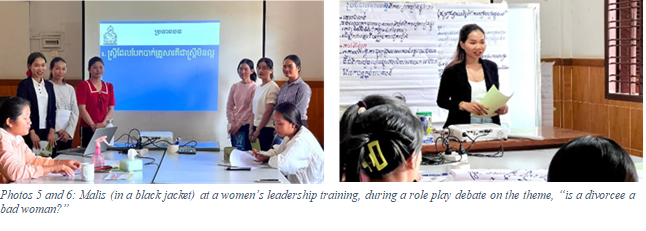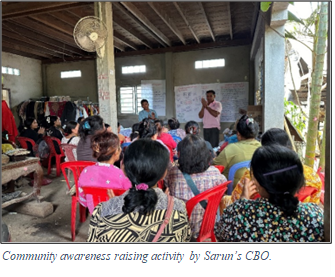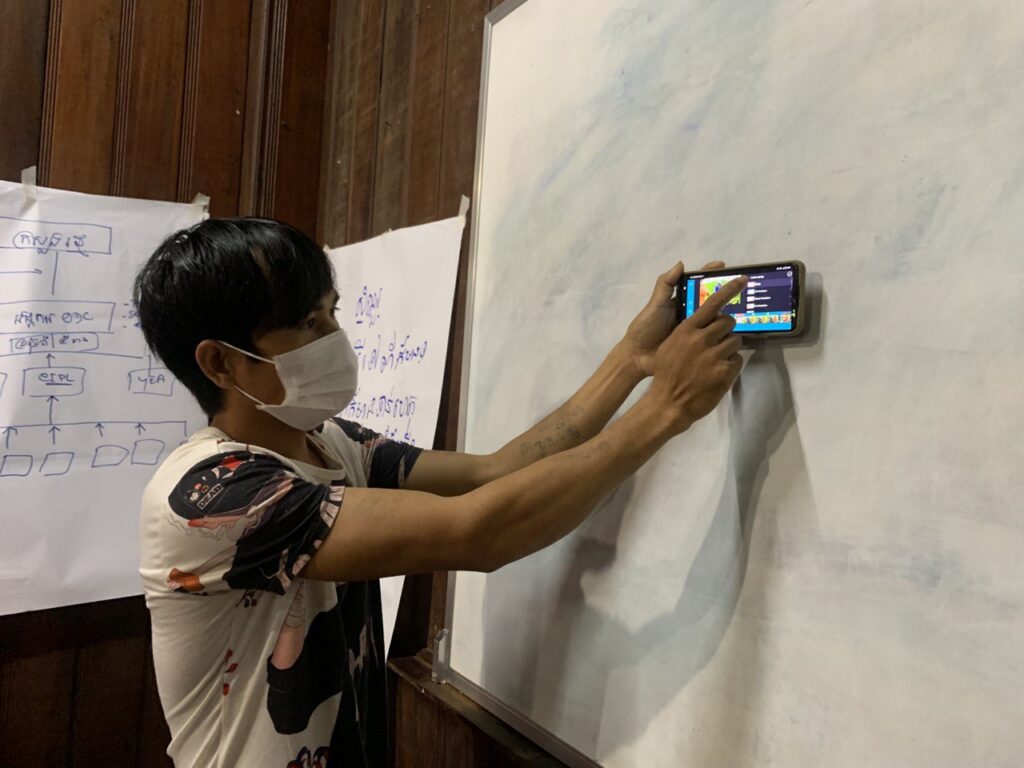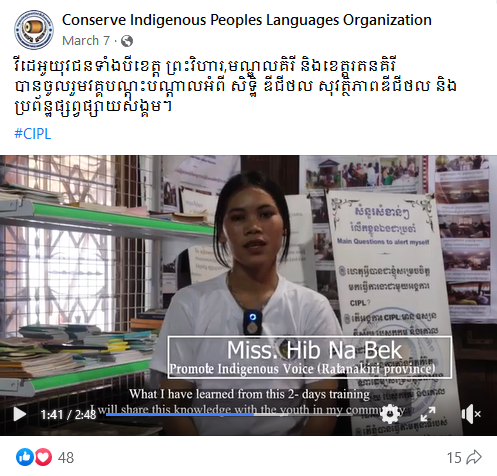Mrs. LEV Malis, 27, from Pouk District, Siem Reap Province was married to a violent and cheating man for seven years, with whom she had two children. Mrs. Malis got depressed and did not dare to go out or face the problem. Sometimes she considered ending her life. She had no one listen to her or be her peer support but was instead blamed by her parents for not being patient enough to be a good woman.
One day, Malis met a leader of Community Based Organization (CBO), Mrs. Tep Mey, who gave her advice and referred her to the Banteay Srei Organization, which provides support to women who are victims of domestic violence. Through the support of Banteay Srei, Malis embarked on a new journey of hope, confidence, and be able to live free from violence. She left her husband, taking her two children with her, and is seeking a divorce, a decision that requires her to overcome many challenges, including social norms that frown on divorce and a difficult legal process.

On September 14, 2022, Malis decided to become a volunteer for Banteay Srei. She attended her first training courses on leadership, self-awareness and facilitation skills and then joined many other workshops about gender-based violence, sexual harassment, abuse and other topics. After attending training workshops and meetings, she gained courage, and shared some of her life experiences, including how she built her self-esteem and self-motivation. In December 2022, she had gained enough confidence to be a guest speaker in the 16-day Campaign to discuss the topic “End Violence Against Women.”
In early 2023, Malis started her own small business in Pouk Market, Siem Reap Province. Her business provides enough income to take care of her two children. She was inspired to share her good business start-up experience, including using digital technology and online marketing, with other women leaders at the Women Leadership Forum in April 2023.
Similar Stories
Shifting attitudes towards sexual harassment
Mr. Oeun Sarun is a 71-year-old CBO leader in Thmey village, Bansay Treng commune, Thmor Kol district, Battambang province. He leads a CBO called “Sahakum Morodak Phum Thmey,” which was selected as one of the cluster members in the Together for Gender Justice (T4GJ) project in October 2022. Mr. Oeun Sarun is a 71-year-old CBO leader in Thmey village, Bansay Treng commune, Thmor Kol district, Battambang province. He leads a CBO called “Sahakum Morodak Phum Thmey,” which was selected as one of the cluster members in the Together for Gender Justice (T4GJ) project in October 2022. Similar to other CBO leaders participating in the T4GJ project, Mr. Sarun facilitated community meetings to share knowledge and understanding of sexual harassment so that participants can further spread the knowledge to the family and neighbors. In his own time, he also continuously disseminated his knowledge to his neighbors and friends as well. He observed that his family and community gradually changed their thinking on sexual harassment, by reflecting on what they did in the past and how they can prevent it now and in the future.
Indigenous youths’ improvement on mobile report
Being trained to use a smartphone to report reflects the view of indigenous youth. “This training is very significant for me since I could use it to empower my community and share with outsiders who we are and what we are living with.” Mr. Lao Bundinh is a Jarai indigenous youth. He was born in a rural area of Phork Thom village, Phork Nhai commune, Ouyadav district, Ratanakiri province, and he has lived there for 27 years. He did not have much knowledge of story writing as well as photos and video shooting. However, he would like to share his daily life as an indigenous youth, his livelihood, and culture, as well as the environment in his community with other people through social media. Mr. Lao Bundinh was sharing how to cut the video by using smartphone during the mobile report training provided by CIPL. Until when he got to know about the mobile report training organized by Conserve Indigenous Peoples Languages (CIPL) in collaboration with Open Development Cambodia (ODC), he had the chance to learn what he liked and waiting for. He joined the mobile report training, which aims to build the capacity of indigenous youths on how to use a mobile phone to report on natural resources management by writing stories and using photos as the evidence-based mechanism on 21 – 22 September 2022 in Ratanakiri province. It required him to put more effort and time into improving his skills. Indigenous youths were joining the training on the mobile report provided by CIPL at Ratanakiri province. His commitment to sharing what is happening within his community inspired him to persevere through the challenges. Currently, he can write a story and edit a video to share on the social media platform. He feels very thankful for the organizer giving him an opportunity to learn what he always wishes to. He posted his own video, “Finished the mobile report training on environment, video shooting, and video editing from CIPL, I could do some practices,” to illustrate the beauty of the forest, environment, and livelihood of his community on social media.
CIPL’s video on digital rights and social media training
The training covered the topics of human rights, digital rights, digital media, and digital trends in Cambodia. Pre and post-test results illustrated that 73% of the trainees improved their knowledge regarding digital security and rights.


